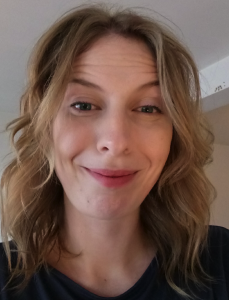This week for our Women on Wednesdays series, we spoke to Dr. Abbey Waldron, a postdoctoral researcher in the High Energy Physics group working on neutrino oscillation physics.

As a little introduction, what area of Physics do you specialize in?
I’m a neutrino physicist. I work on the Deep Underground Neutrino Experiment, which is a long baseline neutrino oscillation experiment. It starts at Fermilab, which is just outside Chicago in the US, and we make a beam of neutrinos by colliding protons on a target and then focusing the charged decay products and then when they decay, the secondary decays form a beam of neutrinos. This beam then travels 1300 km across the US to South Dakota, where we have our far detectors. We also have near detectors close to the beam production and that allows us to observe the neutrinos in both detectors and see how they’ve changed through oscillations as they travel.
The ultimate goal of that work is to see whether neutrinos and antineutrinos behave the same in their oscillation, because the matter-antimatter asymmetry from neutrino oscillations could lead to the matter-antimatter asymmetry that we see in the universe. We see a matter-dominated universe and this could help explain that.
What kickstarted your career in Physics?
I’ve really always been interested in Physics – when I was a kid, I was really interested in space, astrophysics and particle physics. I always knew that I wanted to study that so I went to university to do that. But actually, how I ended up specifically in neutrino physics was a little bit by chance, because I think as an undergraduate I was a bit split between whether I wanted to study fluid dynamics or particle physics. It was a fourth year project that really got me into neutrino physics. I was speaking to people at different projects and then neutrino physics won. It was an experimental project on MINOS, which is one of my current experiment’s predecessors in the US, and it just sounded really exciting, so I did that and I had a great time.
What has your experience been as a woman in Physics? Both positives and negatives.
It’s interesting actually, in general women are a minority in particle physics, but it hasn’t been the case all through my career. When I was doing my PhD I was in an office with three women and two men, so as a graduate student I didn’t actually get to experience that most of the time. But actually, now that I’m at Imperial, it seems much worse because in the Imperial particle physics department, there’s one female professor and that’s it. Now I’m really experiencing that I’m in a huge minority, and it’s strange. I’m trying my best to change this situation – I always take third-year projects and fourth-year Masters projects, and I somehow end up getting way more woman students than my male colleagues do. I don’t particularly set out to take on mostly female students, but I keep running these projects as a good way to get more women into particle physics research.
I think [female] undergrads tend to apply to women supervisors more, we seek them out.
It’s interesting to hear that it’s actually a factor – I think when I was an undergrad, I didn’t have any option, there weren’t any female supervisors, so it didn’t enter into my thinking. I do see that I get more female students asking me about projects.
In your undergrad, did you have a big split in your cohort?
As an undergraduate, I actually studied Maths and Physics, which gives me an interesting perspective, because in Maths, it was 50-50, we weren’t in a minority. But then in my Physics lectures, it was 70-30, something like that. At Cambridge it wasn’t as bad as it is in Imperial, but it’s still noticeable in Physics, and I don’t know why it should be more noticeable in Physics than Maths, but that’s how it was.
What do you like to do outside of Physics?
I dance, so the last few months have been hard! I dance tango and I’ve been doing that for a long time.
Any words of wisdom for any undergrads looking to do a PhD in the future?
I will say absolutely go for it! Doing a PhD was some of the best times of my life, I really enjoyed it. Do something you’re really interested in. I would also recommend a career in academia, if you’re interested in science just go for it. We definitely need more women. I enjoy it – even if you don’t want a career in science, still do a PhD, because doing a PhD is great. For most careers, it’ll give you an advantage in your field anyway!
